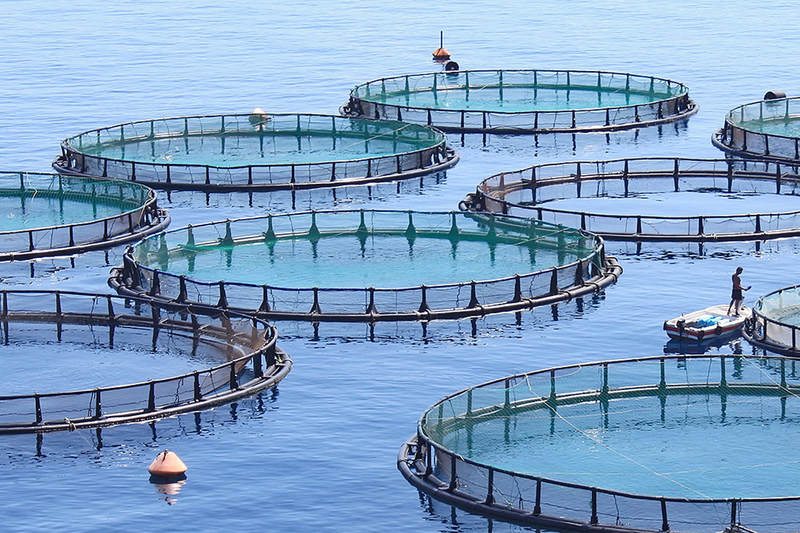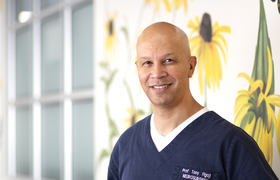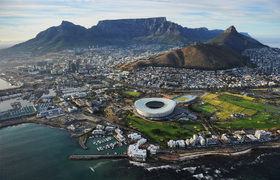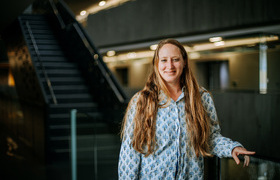Research projects boost aquaculture in Africa
15 October 2019 | Story Nadia Krige. Photo Wikimedia. Read time 8 min.
The University of Cape Town (UCT) is set to make its mark in the development of sustainable aquaculture in Africa, as it embarks on two large collaborative research projects.
As the world population fast approaches 8 billion, fish consumption is expected to increase on all continents by 2030. Except for Africa, where commercially important fish stocks are either fully- or overexploited. With its population growth exceeding supply, Africa has become a net importer of fish; almost 40% of what’s consumed on the continent comes from elsewhere.
This has put a premium on seafood products, leading to a steady decline in consumption, as people opt for more affordable protein.
For countries that have historically been dependent on fisheries, the decline is especially alarming, as it could compromise their ability to meet United Nations (UN) Sustainable Development Goal 2, which aims to “end hunger, achieve food security and improved nutrition and promote sustainable agriculture.”
What about aquaculture?
Overfishing and depletion of fish stocks is, however, not exclusively an African problem. As fisheries aim to satiate the world’s growing appetite for seafood, some 33% of global marine fish stocks are overfished and 59% are fished at maximum sustainable levels.
Aquaculture, however, may offer an alternative to wild-caught fish.
Some 33% of global marine fish stocks are overfished and 59% are fished at maximum sustainable levels.
In 2018, the UN’s Food and Agriculture Association reported aquaculture – freshwater and marine – was the fastest growing food production sector in the world and that, as a food resource, production of farmed fish exceeded wild-caught fish.
Despite strong potential and significant expansion of its existing aquaculture industry, which is based mostly on land, Africa accounts for only 2% of global aquaculture production. While the reasons for this are manifold and complex, it comes down to two important factors: resources and expertise.
“Of those few aquaculture enterprises that have been successful, most involve expertise from outside,” explains John Bolton, emeritus professor and senior research scholar in the Department of Biological Sciences at UCT. “Furthermore, products are often exported and not used by the local community. This, of course, requires suitable infrastructure and sound financial support.”
In South Africa, one major success story is abalone, which represents over 90% of marine aquaculture in the country by value.
Sustainable marine aquaculture in Africa
In recognising the potential for aquaculture – marine aquaculture, in particular – to provide much-needed food security, create job opportunities and boost local business prospects throughout Africa, researchers from across the continent have joined forces to form the Research Network for Sustainable Marine Aquaculture in Africa (AfriMAQUA).
Launched in September 2019, AfriMAQUA aims to bring marine aquaculture researchers from Southern, East and West Africa, as well as France, together to exchange knowledge, pool research efforts and strengthen capacities. The overarching goal is to facilitate scientific cooperation for the development of sustainable marine aquaculture.
Africa accounts for only 2% of global aquaculture production.
“Marine aquaculture output in sub-Saharan Africa is very low with a significant portion being produced in South Africa,” explains Bolton, one of UCT’s AfriMAQUA project leads. “A major aim of AfriMAQUA is to link scientists working on various marine aquaculture projects in the region to enable synergy and increase the profile of the industry.”
AfriMAQUA’s kick-off meeting took place at facilities in and around Cape Town, and included delegates from the Ivory Coast, Senegal, Tanzania, Kenya, Mauritius, Namibia and South Africa. The network is funded by The French National Research Institute for Sustainable Development (IRD) and coordinated by the IRD’s Dr Maria Darias.
One Health
As part of larger AfriMAQUA activities, UCT will launch One Health: a major marine aquaculture project led by Vernon Coyne, an associate professor in the Department of Molecular and Cell Biology.
“The programme is focused on ensuring the healthy production of aquacultured fish and shellfish,” Coyne explains. “We’re taking a holistic approach, so it’s developing feeds that would boost the immune systems of the animals that you’re farming and also improve growth rates.”
The project’s objectives include:
- Developing vaccines against emerging diseases of indigenous fish that are cultured.
- Developing feed supplements for cultured abalone and sea urchins.
- Determining the effect of seaweed and probiotic supplements on rainbow trout reared in seawater.
- Understanding the community structure of microbes living on sea lettuce (of the genus Ulva) grown in different conditions.
Coyne’s lab will conduct the research in partnership with Bolton’s lab, Associate Professor Denzil Beukes from the University of the Western Cape, and Drs Brett Macey and Mark Cyrus from the South African Department of Environment, Forestry and Fisheries.
As far as capacity growth is concerned, the project is expected to train at least 15 young researchers, of whom 13 are women.
“We hope that a lot of the research will eventually lead to start-ups – things like probiotic and vaccine production,” Coyne says. “These spin-off companies will use the technology we generate here to service existing aquaculture farms and new farms throughout South Africa – and even the rest of Africa.”
Collaboration is king
Both Coyne and Bolton express their hope that these collaborative efforts will lead to a culture of sharing knowledge and expanding horizons within the continent’s aquaculture industry.
“Aquaculture needs to be sustainable biologically, environmentally and economically. Therefore, sharing expertise and ideas is of the utmost importance in this rapidly developing phase.”
“I’ve just been to Japan. And there, industry, academia and the government work on plans together – it’s very integrated,” says Coyne. “We really hope that the same kind of thing could happen here.”
For Bolton, it is critical that the same wheel does not continue being reinvented within the industry.
“It is critical to share experiences, so that decisions can be made on the future of potential aquaculture species and industries,” he concludes.
“Aquaculture needs to be sustainable biologically, environmentally and economically. Therefore, sharing expertise and ideas is of the utmost importance in this rapidly developing phase.”
 This work is licensed under a Creative Commons Attribution-NoDerivatives 4.0 International License.
This work is licensed under a Creative Commons Attribution-NoDerivatives 4.0 International License.
Please view the republishing articles page for more information.










